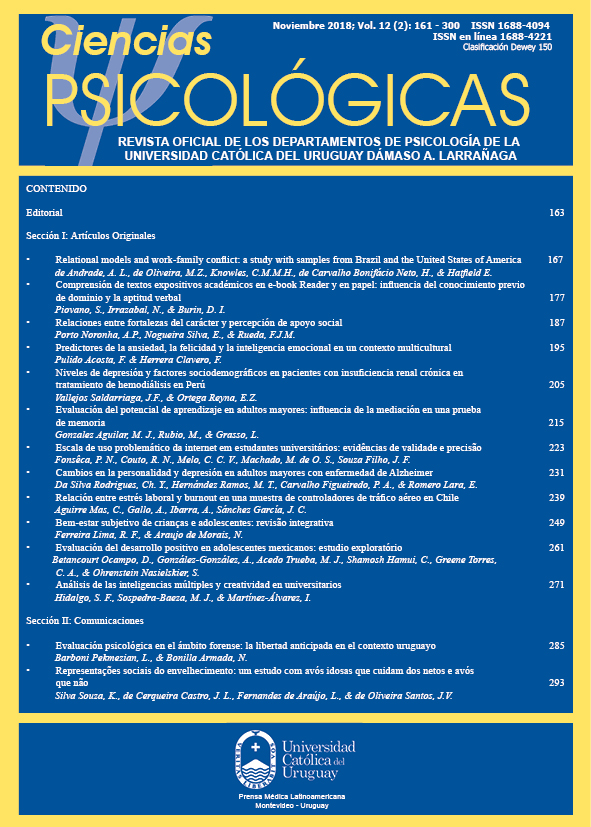Predictors of anxiety, happiness and emotional intelligence in a multicultural context
DOI:
https://doi.org/10.22235/cp.v12i2.1682Keywords:
emotions, anxiety, happiness, emotional intelligence, pluricultural contextAbstract
This work has as main objective to analyze the predictors of Anxiety, Happiness and EI, according to age, gender, culture and socioeconomic and cultural, as well as the relationships that could be given between all the variables. To make it possible we focused on 811 participants; 71.6% of the total were Muslims and 28.4% belonged to the Christian religion, 46.1% were male and 53.9% female. The techniques used in this survey were the STAIC (Spielberger, 2001), a Happiness questionnaire, as well as an EI questionnaire built for its use. The results reflect that the predictors of Anxiety are Age and Gender. For Happiness, are Age, Culture, Socioeconomic and cultural and Gender. We found a strong and inverse relationship between Anxiety and Happiness. EI predictors are age, culture and gender. There is no statistically significant relationship between Anxiety and Emotional Intelligence, but we found it between Emotional Intelligence and Happiness.
Downloads
References
Adamsons, K. (2013). Predictors of relationship quality during the transition to parenthood. Journal of Reproductive and Infant Psychology, 31, 160–171. doi:10.1080/02646838.2013.791919
Azpiazu, L., Esnaola, I., & Sarasa, M. (2015). Predictive capacity of social support on emotional intelligence in adolescence. European Journal of Education and Psychology, 8(1), 23-29.
Brouzos, A., Misalidi, P., & Hadjimatheou, A. (2014). Associations Between Emotional Intelligence, Socio-Emotional Adjustment, and Academic Achievement in Childhood: The Influence of Age. Canadian Journal of School Psychology, 29(2), 83–99.
Carballeira, M., González, J. A., & Marrero, R. J. (2015). Diferencias transculturales en bienestar subjetivo: México y España. Anales de Psicología, 31(1), 199-206. doi: 10.6018/analesps.31.1.166931
Cazalla-Luna, N. & Molero, D. (2014). Inteligencia emocional percibida, ansiedad y afectos en estudiantes universitarios. Revista Española de Orientación y Psicopedagogía, 25(3), 56-73. doi:10.5944/reop.vol.25.num.3.2014.13858
Cejudo, J. (2016). Relationship between Emotional Intelligence and mental health in School Counselors. Electronic Journal of Research in Educational Psychology, 14(1), 131-154. doi.org/10.14204/ejrep.38.15025
Gutiérrez, M. & Expósito, J. (2015). Autoconcepto, dificultades interpersonales, habilidades sociales y conductas asertivas en adolescentes. Revista Española de Orientación y Psicopedagogía, 26(2), 42-58. doi:10.5944/reop.vol.26.num. 2.2015.15215
Gallegos, J., Linan-Thompson, S., Stark, K., & Ruvalcaba, N. (2013). Preventing childhood anxiety and depression: Testing the effectiveness of a school-based program in Mexico. Psicología Educativa 19, 37-44. doi:10.5093/ed2013a6
Gómez-Ortiz, O., Casas, C., & Ortega-Ruiz, R. (2016). Ansiedad social en la adolescencia: factores psicoevolutivos y de contexto familiar. Behavioral Psychology/Psicología Conductual, 24(1), 29-49.
Katyal, S. (2013). Emotional intelligence and academic achievement of ninth graders: A comparative study of boys and girls. Indian Journal of Health and Welbeing, 4(1), 171-174.
Limonero, J. T., Fernández-Castro, J., Soler-Oritja, J., & Álvarez-Moleiro, M. (2015). Emotional intelligence and recovering from induced negative emotional state. Frontiers in Psychology, 6(816), 1-8. doi: 10.3389/fpsyg.2015.00816
Moreno-Rosset, C., Arnal-Remón, B., Antequera-Jurado, R., & Ramírez-Uclés, I. (2016). Anxiety and psychological wellbeing in couples in transition to parenthood. Clínica y Salud, 27, 29–35. doi:10.1016/j.clysa.2016.01.004
Oberle, E., Schonert-Reichl, K. A., & Zumbo, B. D. (2011). Life satisfaction in early adolescence: Personal, neighborhood, school, family, and peer influences. Journal of Youth and Adolescence, 40, 889-901.
Peña-Sarrionandia, A., Mikolajczak, M., & Gross, J. J. (2015). Integrating emotion regulation and emotional intelligence traditions: a meta-analysis. Frontiers in Psychology, 6(160). doi: 10.3389/fpsyg.2015.00160
Pinto, B. M. D. C., Dutra, N. B., Filgueiras, A., Juruena, M. F. P., & Stingel, A. M. (2013). Diferenças de gênero entre universitários no reconhecimento de expressões faciais emocionais. Avances en Psicología Latinoamericana, 31(1), 200-222.
Pulido, F., Herrera, F. (2017). La influencia de las emociones sobre el rendimiento académico. Ciencias Psicológicas, 11(1), 29-39.
Quiceno, J. M., & Vinaccia, S. (2015). Psicología Positiva e infancia: análisis exploratorio de instrumentos. Manuscrito no publicado, Universidad Autónoma de Madrid, España.
Restrepo, C., Vinaccia, S., & Quiceno, J. M. (2011). Resilencia y depressión: Un estudio exploratorio desde la calidad de vida en la adolescencia. Suma Psicológica, 18, 41-48.
Roa, J. M. (2006). Rendimiento escolar y “situación diglósica” en una muestra de escolares de educación primaria en Ceuta. Revista Electrónica de Investigación Educativa, 8(1). Recuperado de http://redie.uabc.mx/vol8no1/contenido-roa.html
Rosa, G., Riberas, G. Navarro-Segura, L., & Vilar, J. (2015). El Coaching como Herramienta de Trabajo de la Competencia Emocional en la Formación de Estudiantes de Educación Social y Trabajo Social de la Universidad Ramón Llull, España. Formación Universitaria, 8(5), 77-90. doi:10.4067/S0718-50062015000500009
Siqués, C., & Vila, I. (2014). Estrategias discursivas y aprendizaje de la lengua escolar: un estudio etnográfico en un aula de alta diversidad étnica y lingüística. Cultura y Educación, 26(2), 349-376. Recuperado de http://dx.doi.org/10.1080/ 11356405.2014.935112
Spielberger, C. D. (2001). STAIC. Cuestionario de Ansiedad Estado/Rasgo en niño. Madrid: TEA.
Van Dierendonck, D. (2004) The construct validity of Ryff’s Scale of Psychological well-being and its extension with spiritual well-being. Personality and Individual Differences, 36(3), 629-644.
















